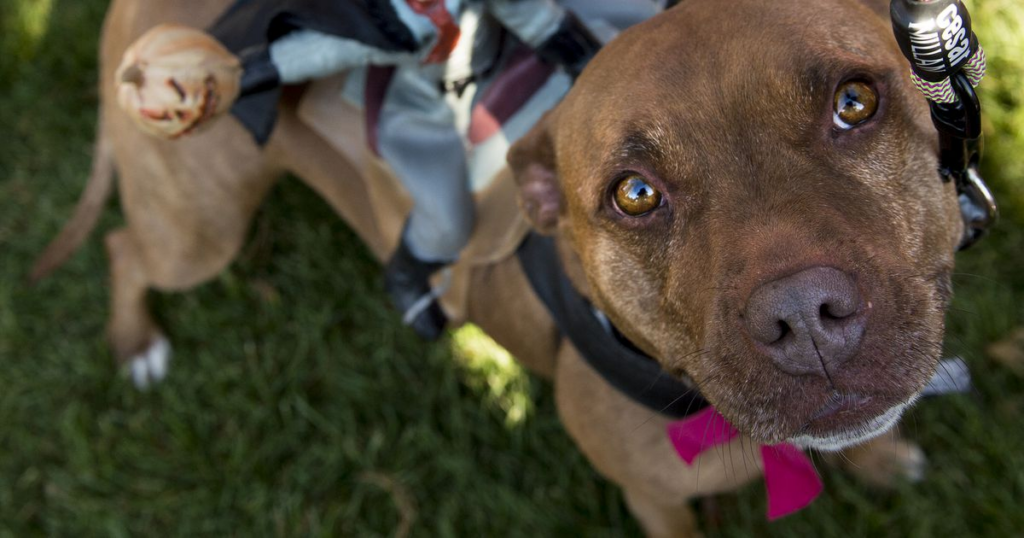There have been two stories recently about dog attacks, both of which named the breed of the dog as pit bull. I’m a professor of psychology that has published and presented on dog cognition and aggression on and off over the past 17 years. I also worked in various dog welfare settings for about 10 years, and I have the bite scars to prove it. You might have even seen my students lingering around your neighborhood dog park with clipboards documenting dog-on-dog aggression.
Now, I do not want to minimize the fear and serious harm victims and survivors experienced, but I’m seeing classic myths swirl around about the breed.
First off, calling them a specific breed is a mistake. For any dog to be called a certain breed, their pedigree must be regulated by either the United Kennel Club or American Kennel Club — and they breed solely for appearance and parental lineage, not behavior. I doubt the police checked the dog’s papers to ensure they were in fact American pit bull terriers, American Staffordshire terriers or Staffordshire bull terriers — the breeds that one could actually argue are pit bulls.
The vast majority of dogs are not bred with pedigrees. Instead, Lady and the Tramp meet, fall in love over a plate of spaghetti and mix their DNA on their own. Even if you get a dog from a hobby or backyard breeder, they are almost guaranteed to have another breed — like a mastiff or English bulldog — tossed in there.
Your dog’s DNA test is also woefully inaccurate. Sorry, but the breeds just aren’t different enough. They all are the same sub-species of wolves, canis lupus familiaris.
Next, research has shown that even experts cannot reliably guess a dog’s breed. Often anything with a stocky head and stout body gets called a pit bull mix — Labradors, anybody? So when an attack does happen, judgment calls are made by police, journalists and victims. We also know that police are more likely to claim a dog is a certain breed if they think it’s one with bad stereotypes associated with it. Journalists are also more likely to report attacks supposedly from maligned breeds. To do good work, journalists should not mention the dog’s claimed breed at all, or at least have some serious qualifiers like I mentioned above.
Even though we know that breed is typically not reliable, people make essentialist arguments about breed behavior. They claim pit bulls were bred for aggression. With that logic, so were dachshunds (to attack rodents larger than them) and Great Pyrenees (to be territorial and attack large wild carnivores.) But research has shown that there is far too much variability across breeds to make claims about what one individual might do. Again, they are still the same sub-species of animal.
Instead of the breed earning the stereotype, it could actually be that the stereotypes created aggressive dogs. After World War II, German shepherds were considered dangerous dogs for obvious reasons. Dobermans and Rottweilers had their time in the media spotlight, now pit bulls. Attacks by these supposed breeds ebb and flow with the myth, because bad owners may be drawn to the myths creating a feedback loop. The popularity of breeds in good households changes over time also. Pit bull type dogs are a very popular breed, so by pure chance, we would see more cases of bites with them.
Which brings me back to the two cases in the news. There were certainly more dog bites in Utah over the past few weeks than just those two. But the vast majority never make the news. When researchers look at the circumstances around newsworthy dog attacks, or try to look for innate tendencies in pedigreed dogs, there is no reliable difference across breeds.
While dogs with good owners will bite sometimes, other major themes emerge. For example, the most likely victims are young children who were likely annoying the dog. Dogs that are abused, neglected, tied up 24/7 or removed from their mother and littermates too soon will also become defensive and territorial.
The attacks that happened recently are terrifying, and we as a society should take steps to stop them. But research has shown breed-specific legislation simply does not work. Every expert organization has argued against them. It only causes stress and undue harm to families that must move or lose their beloved family member, like in Denver where they confiscated and euthanized thousands of family pets just because they might have been pit bulls.
If you are a dog lover, anti-science rhetoric and inhumane laws should scare you just as much as the dog attacks themselves. Stopping animal abuse and neglect and encouraging education about how to interact with dogs works. Banning wishy-washy breeds does not.
Justice Morath
Justice Morath is a professional science communicator and associate professor of psychology at Salt Lake Community College. He has had three pit bull type dogs as family members over the years.
The Salt Lake Tribune is committed to creating a space where Utahns can share ideas, perspectives and solutions that move our state forward. We rely on your contributions to do this. Find out how to share your opinion here, and email us at voices@sltrib.com.
Donate to the newsroom now. The Salt Lake Tribune, Inc. is a 501(c)(3) public charity and contributions are tax deductible
Report a missed paper by emailing subscribe@sltrib.com or calling 801-237-2900
For e-edition questions or comments, contact customer support 801-237-2900 or email subscribe@sltrib.com
sltrib.com © 1996-2024 The Salt Lake Tribune. All rights reserved.

